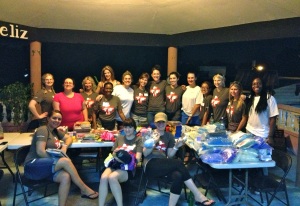By Rachel Carruth
Seventeen nursing students from the College of Southern Nevada served in Belize, summer 2013, providing free healthcare to locals.
This service-learning opportunity provided CSN students and graduates with opportunities to help in medical clinics, hospital and pharmacy.
“I honestly never imagined I would experience such an incredible opportunity to go on a medical mission trip to a third world country,” said Taylor Christensen, who was inspired by the trip to Belize. “I was so grateful, willing to help and eager to help underprivileged people in any way that I could.”
The CSN nursing students spent 14 days in the Orange Walk district of Belize. They were able to assist in various community and personal home visits and run clinics in three remote villages: August Pine Ridge, San Felipe and Carmelita.
“I saw a great need and unique opportunities internationally,” said Tracey Long, a registered nurse and instructor at CSN who mentored the students. “I served as a health-service missionary in Colombia 25 years ago and my wish was to be able to take students to South America and show them the beauty of the Hispanic and Latino cultures that I was so blessed to discover for myself.”
The nursing students were able to provide free medical services to locals in the villages, learn about various tropical diseases and natural plant remedies used by the ancient Mayans in the area.
“Once we finished the home visits, we spent an hour or two with a local bush doctor in his home,” wrote Brittany Perez, a recent CSN graduate and registered nurse, in a blog that she kept during the service- learning trip to Belize. “Mr. Blanco, a local bush doctor there, took us around his yard and showed us thirty different herbs and plants.”
The nursing students provided precious hope to many of the forlorn people in the community’s incredibly archaic hospitals.
“The students were shocked to see the unsanitary and primitive conditions of the remote villages there,” Long said. “They had the opportunity to assess home outhouses, water wells and educate the villagers about more sanitary methods.”
“You’re used to seeing health care in the U.S., but in another country, simple things like hygiene can really affect a person’s well-being,” said Janice Dinglassan, a current student in CSN’s nursing assistant program.
Millions around the globe have no health care or very limited access to such important care.
By serving in an international country, the students were able to gain new perspectives about global and community health through their lived experiences.
International Service Learning, an educational NGO that provides opportunities for students from over a hundred universities around the world to help under-served populations in Central and South America, Mexico, the Caribbean and Africa, provided this experience for the CSN nursing students. The dynamic and exciting in-the-field program provided students with meaningful opportunities for engagement and education.
“This international experience enriched my life and it was fun for me to watch the growth and learning from my students,” Long said. “I believe it made a great impact on them. It changed the lives of many students forever.”
“I learned so much from this amazing medical mission,” Christensen said.” I originally had no plans of wanting to be a nurse. I just wanted to help out, but after helping others and seeing how much they appreciate it, I just want the feeling to go on forever. Now, I actually do want to become a traveling nurse and travel around the country and help people.”
“This trip really changed my life; everyday was an adventure,” Perez said. “I know it sounds cliché, but it pushed me past my self-imposed limits.”
The nursing students from CSN were encouraged to improve their medical Spanish and communications skills while performing vital assessments.
“The students tried hard to learn and speak Spanish,” Long said. “ISL provided the translators and I taught them basic medical Spanish phrases so that they could communicate more effectively.”
The experience promoted cultural competence and helped students gain knowledge on global adaptability.
“Human nature and needs are basically the same all around the world,” Long said. “Try not to be so blinded by your own ethnocentrism. Be an instrument for good in the world and try to see beyond the traditional western medicine way of thinking…while opening your hearts to others.”
“I want to provide care for anyone and everyone,” Dinglassan said. “Being able to provide care for someone who might otherwise not have it, that’s fulfilling in its own right.”




